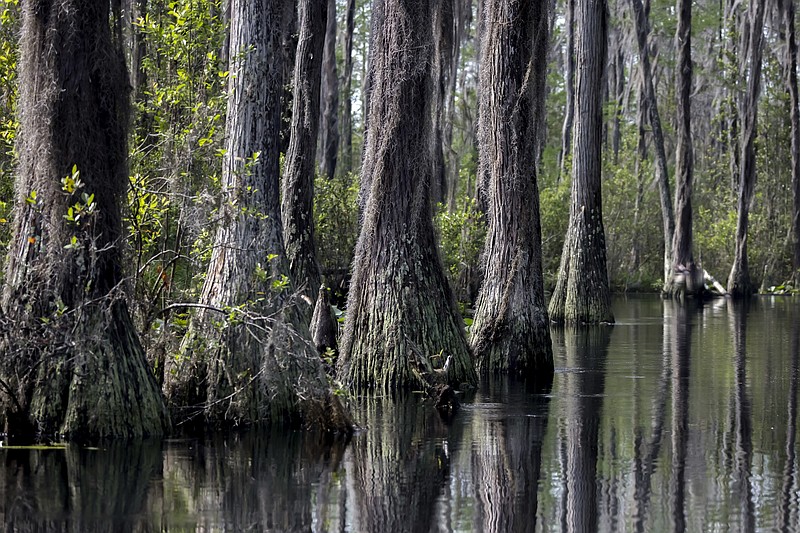Gail Jane Whatley said she was just 10 years old when she visited Georgia's Okefenokee Swamp for the first time six decades ago. Taken by the swamp's "beauty and otherworldly serenity," Whatley said she has been returning ever since.
"As an outdoor enthusiast, I have traveled extensively, visiting many wild places around the world and have found little to compare with the Okefenokee," she said.
Whatley was one of nearly 100 speakers representing generations of visitors to the Okefenokee Swamp who spoke passionately during a virtual public meeting Tuesday night in opposition to an Alabama company's plan to strip mine at the wetland's edge. None spoke in favor of the project.
Last month, the Georgia Environmental Protection Division (EPD) released draft permits to Twin Pines Minerals for a 584-acre mine that would extract titanium and other minerals from atop the ancient sand dunes on the swamp's eastern border, which holds water in the refuge.
The company says its analysis shows the mine will not lower water levels in the swamp, an assessment EPD officials have agreed with. But environmentalists say the company has failed to prove its case. Prominent scientists, including some with the federal government, have also questioned Georgia regulators' conclusions that the mine won't damage the fragile ecosystem.
State legislators, meanwhile, appear unlikely to advance legislation that might stop Twin Pines from expanding the mine in the future. One bill in the General Assembly, HB 71, has been bottled up in a House committee for three sessions, despite bipartisan support from a majority of the chamber's lawmakers.
Over three hours, fishermen, paddlers, geologists, educators, parents and grandparents ticked through a myriad of scientific, legal and moral arguments for why EPD should deny the company permits.
Speaking on behalf of the U.S. Fish and Wildlife Service (FWS), Michael Lusk, the refuge manager for the Okefenokee National Wildlife Refuge, said the agency opposes the mine and does not believe the company's modeling accurately reflects the impact it will have on the swamp. Twin Pines is seeking a permit to pump 1.4 million gallons of groundwater a day from the Floridan Aquifer.
"We need better information before taking a risk that could impact such an important national treasure," Lusk said.
Others pointed to a recent letter FWS Acting Regional Director Mike Oetker sent to EPD Director Jeff Cown, asserting federal rights to the water that fills the Okefenokee as a legal rationale for the state to deny the permits. In the Jan. 31 letter, which was first reported by the Associated Press, Oetker said the agency is "concerned that the issuance of a permit at this juncture would not preserve sufficient water" for the refuge.
The board of commissioners in Charlton County, where much of the swamp is located, has endorsed Twin Pines' project and the economic boost the company claims it will bring. Twin Pines has promised to create about 400 full-time jobs, with annual salaries averaging around $60,000. That's significantly higher than the county's median household income of $45,770, according to the U.S. Census Bureau.
But on Tuesday night, several local residents said they oppose the mine.
Josh Howard, president of the nonprofit Friends of the Okefenokee National Wildlife Refuge and a lifelong Charlton County resident, said local elected officials and wealthy landowners who support the mine don't represent the majority's view.
"There's just no sense in risking the (Okefenokee) National Wildlife Refuge just to make rich people richer by mining for an extremely non-essential mineral," Howard said. Titanium alloys can be used in aircraft and weapons systems, but the element's most common use is in titanium dioxide, a whitening agent used in toothpaste and other household products.
Some speakers also said Twin Pines' record of environmental infractions should push EPD to change course.
Earlier this year, Twin Pines agreed to pay a $20,000 fine to EPD for drilling soil samples back in 2018 without a professional geologist on site, as Georgia law requires. The company also did not post the necessary bond required for the work. Twin Pines disputes that a violation occurred.
The public still has until April 9 to weigh in on the draft permits. Comments can be emailed to TwinPines.Commentdnr.ga.gov.
EPD said it will review all comments, which could take anywhere from several days to several months, before making a final decision on whether to grant permits.
Toward the end of Tuesday's public meeting, Mohammad Ghori, who identified himself as a software engineer from Dallas, Texas, said he was stunned to see the permitting process advancing. Ghori said he was inspired to speak out about what he views as an existential threat to a "globally unique natural resource." The Okefenokee could soon be nominated for listing as a World Heritage Site, a prestigious honor reserved for sites with universal value, like Peru's Machu Picchu and Australia's Great Barrier Reef.
Ghori implored Georgians and state officials to take a stand against the mine.
"You all have something that no one else on Earth does," Ghori said. "Don't let them take this from you. Not now, not ever."
How to weigh in on Twin Pines' permit
Submit written comments to EPD at TwinPines.Commentdnr.ga.gov. The deadline for submissions is April 9 at 4:30 p.m.
